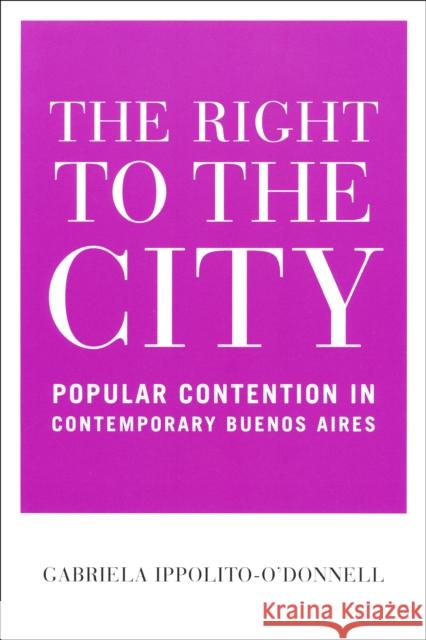Right to the City: Popular Contention in Contemporary Buenos Aires » książka
Right to the City: Popular Contention in Contemporary Buenos Aires
ISBN-13: 9780268031794 / Angielski / Miękka / 2011 / 304 str.
Based on extensive, original fieldwork, as well as new survey data, The Right to the Citycontributes to the study of democratization by focusing on the dilemmas and opportunities of popular contention in the city of Buenos Aires. It also offers an excellent overview of the history of social mobilization in Argentina. Gabriela Ippolito-O'Donnell's main assertion in this study is that through various channels of collective action and associational activities, as well as by voting, the urban popular sector is a fundamental actor in the pursuit of the expansion and consolidation of citizenship rights. Using both qualitative analysis and quantitative data, Ippolito-O'Donnell explores what factors--economic, politico-institutional, organizational, and subjective--account for the emergence in the 1980s, and collapse in the 1990s, of a wave of grassroots popular organizations in Villa Lugano, a poor neighborhood located in the south of Buenos Aires. She identifies factors crucial for explaining the organizational weakness and concomitant cyclical patterns of collective action by the urban poor, as well as the consequences for alleviating poverty and inequality in this newly democratized nation. "Gabriela Ippolito-O'Donnell's The Right to the City is an important contribution to the literature on social movements, democratization, and Latin American studies. It is timely, well written, theoretically ambitious, and rich in its empirical analysis. Ippolito-O'Donnell makes a strong case against clientelism in the context of Argentina's democratization, based on her analysis of contentious politics among Buenos Aires's poor. Her work will be of interest to scholars in the social sciences as well as to policy-makers involved in anti-poverty programs and local development, including urban, housing, and transportation policies." --Veronica Montecinos, Penn State University











